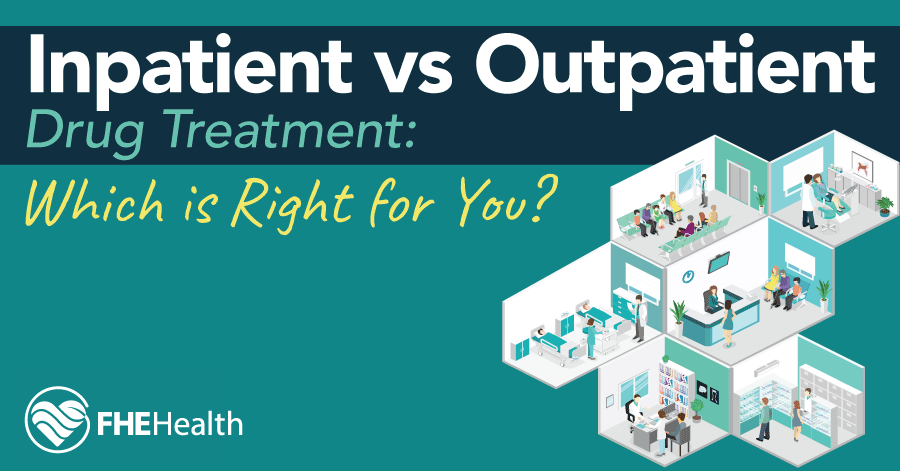
The Substance Abuse and Mental Health Services Administration estimates that a staggering 20.2 million American adults have a substance use disorder. That’s over 8% of the entire population. Substance use disorders are devastating for both the struggling individual and their families and loved ones. Typically speaking, these disorders are progressive. That means they get worse before they better. When left untreated, they can lead to premature death.
Deciding to get help for an addiction problem is a challenging choice, and there are many options available if you or a loved one is struggling. Learning the differences between different levels of care (i.e., inpatient vs. outpatient) can help you make the best decision for treatment.
Who Needs Addiction Treatment?
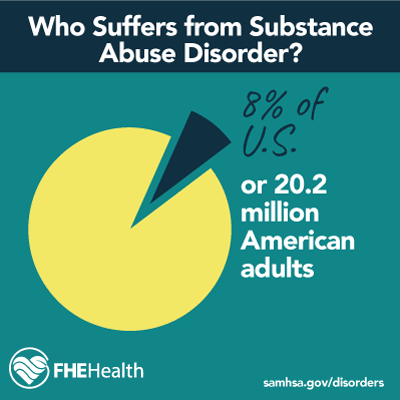 It can be hard to know if you or someone you love has an addiction. That’s because substance use disorders can be conniving and deceiving. People often lie to themselves and others about the severity of their problem.
It can be hard to know if you or someone you love has an addiction. That’s because substance use disorders can be conniving and deceiving. People often lie to themselves and others about the severity of their problem.
In general, someone may benefit from substance treatment if any of the following apply:
- the inability to stop using substances despite wanting to stop
- consistent consequences associated with using
- intensified cravings to use most or all of the time
- increased tolerance to a certain substance or substances
- the presence of mental health issues in conjunction with substance use
Addiction treatment is not a cure, but it can be a helpful stepping stone for those needing additional support.
Many people cannot stop using on their own. They need the professional structure and tools to build their lives back together.
How to Evaluate Your Needs for Treatment
The choice between inpatient vs. outpatient rehab is a significant part of your recovery journey and can have a direct impact on the level of support you have to prevent relapsing. To determine which type of treatment is right for you, it’s critical to understand the difference between inpatient and outpatient rehab and the benefits of each approach. To assess whether you should attend an inpatient or outpatient treatment program, consider the advantages and disadvantages of the treatment types.
Benefits of Outpatient Treatment
Outpatient rehab offers many perks, including a more comfortable experience that doesn’t require you to uproot yourself from daily life. Other benefits of this style of treatment include:
- Support throughout treatment from loved ones
- Stability through continued daily routine at home
- Lower cost of treatment
- Choices regarding the type of therapy you prefer
- Convenience of booking appointments around your personal schedule
Potential Disadvantages of Outpatient Rehab
While there are many reasons to take part in an outpatient rehab program, this isn’t the best style of treatment for everyone. Some cons of outpatient care include:
- Lack of support for those struggling with an urge to use drugs and alcohol (care is not available 24/7)
- No accountability if you don’t show up to your therapy appointments
- No immediate medical supervision when detoxing from drugs or alcohol
For this reason, individuals who are struggling to get off drugs and alcohol and are in the early stages of treatment may find there’s insufficient support through outpatient rehab.
Benefits of Inpatient Treatment
Inpatient rehab programs offer different advantages than those of outpatient care. Inpatient treatment:
- Supports you around the clock while detoxing from substances
- Offer access to care 24/7 so you’re never alone as you navigate recovery
- Is structured to provide a framework for overcoming addiction that doesn’t rely on your ability to manage time or commit to appointments
Potential Disadvantages of Inpatient Rehab
While inpatient rehab is incredibly valuable for those who don’t have a solid support system or a safe place to call home, there are some potential downsides:
- Upheaval from daily life (requires time away from school, work and family)
- You don’t have control of your daily treatment schedule
- Costs are higher
Inpatient vs. Detox Treatment
Inpatient care and detox treatment can be part of the same treatment program but aren’t one and the same. Detox treatment occurs at the beginning of recovery as a way to get the substance out of your system. This may be overseen by medical professionals as part of inpatient treatment. Overall, inpatient rehab goes beyond the detox phase to give you the tools to succeed outside of the rehab.
Treatment After a Relapse
Relapse can be a normal part of the recovery process, even if it’s frustrating and shameful. For this reason, it is important that you don’t associate relapse with failure. Just because you were not able to stay sober after a certain treatment episode does not mean that you are back at square one.
Seeking treatment after a relapse can be difficult- especially if you’ve been in a treatment setting before. However, getting back into a structured and supportive environment may be the only choice that saves your life.
What is Inpatient Treatment?
Inpatient treatment refers to the highest level of care. It’s the most restrictive, and it’s for the most serious of addiction cases. Inpatient treatment refers to 24/7 monitoring, structure, and supervision. Clients receive round-the-clock services that may include:
- Medication monitoring and evaluation
- Individual therapies
- Group therapies
- Routine and randomized drug testing
- Support groups
Inpatient Treatment Locations
Inpatient treatment can take place in a variety of settings including hospitals, nonprofit clinics, and freestanding, private drug and alcohol treatment facilities. There are locations all over the country. With that said, many professionals recommend attending a facility away from your current environment. Because your current location can be strongly associated with various triggers, it’s often best to focus on your treatment away from these reminders.
Inpatient Treatment Structure
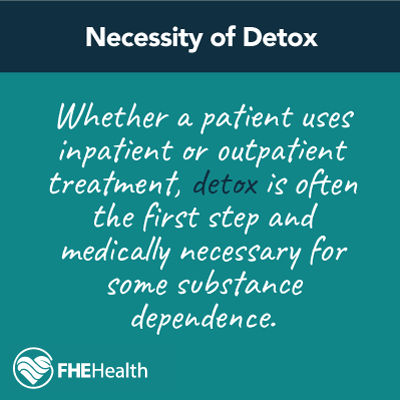 Nearly all patients begin their inpatient treatment process by completing a detox protocol.
Nearly all patients begin their inpatient treatment process by completing a detox protocol.
What is Inpatient Detox?
Detox refers to the various interventions used to manage and stabilize acute intoxication and withdrawal. During detox, the body clears itself from the toxins associated with abused substances. The detox process varies from individual to individual and can depend on a variety of factors including:
- types of drugs used
- the frequency of drug use
- the client’s age
- medical history
- mental health history
- number of detox processes in the past
No doubt, distressing withdrawal symptoms can make detox seem like a scary process. Many people who have experienced withdrawal on their own find it unbearable. With that said, monitored and supervised detox programs provide clients with safety and comfort during this difficult time. You may receive medications that can assist with the physical and emotional distress.
In general, inpatient detox can help save someone’s life. Withdrawal from certain substances, such as alcohol or benzodiazepines, can be fatal when unsupervised. Furthermore, if someone has medical or mental health issues, the detox process can exacerbate those symptoms. The length of a client’s detox will also vary on a case-by-case basis. With that said, most people successfully complete this phase within a few days to a week.
After Detox: Residential/Inpatient Care
After completing detox, clients typically enter the inpatient treatment portion of their care. Each facility varies in what the daily structure looks like, but clients can typically expect various groups, therapies, and meetings related to:
- relapse prevention
- coping skills and distress tolerance
- family dynamics
- healthy relationships and setting boundaries
- drug education and/or harm reduction
- meditation and mindfulness
- peer relationships
- self-esteem and self-worth
Most inpatient programs have daily schedules where clients are expected to attend various groups and therapies. Typically, clients also attend support groups, such as Alcoholics or Narcotics Anonymous, on a regular basis as well. The length of inpatient care depends on a variety of factors including one’s current medical needs, a history of addiction, and external circumstances. With that said, most programs last between 30-90 days.
Can You Leave Rehab at Any Time?
Whether you can leave rehab at any time typically depends on your individual circumstances. In the case of court-ordered rehab, a judge mandates your treatment, requiring you to complete the designated program as part of your sentencing.
What is Outpatient Treatment?
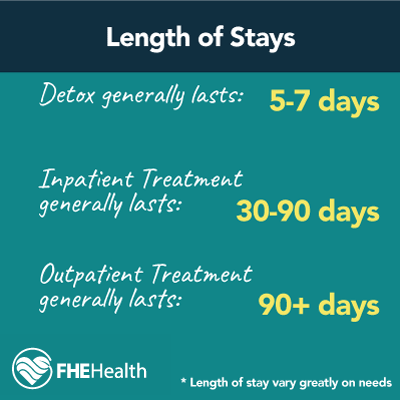 Outpatient treatment is less extensive than inpatient treatment, but it can be a beneficial option for those needing support and structure in their initial sobriety journey. In outpatient treatment, clients commute to and from the facility. They live on their own (as opposed to an inpatient or residential care). In other words, they balance some ‘real-world freedom’ with treatment responsibilities.
Outpatient treatment is less extensive than inpatient treatment, but it can be a beneficial option for those needing support and structure in their initial sobriety journey. In outpatient treatment, clients commute to and from the facility. They live on their own (as opposed to an inpatient or residential care). In other words, they balance some ‘real-world freedom’ with treatment responsibilities.
Outpatient Treatment Locations
Similar to inpatient settings, outpatient care can take place in a variety of places. These places include hospitals, doctor’s offices, nonprofit clinics, and private facilities. Many facilities have both an inpatient and outpatient component within their programs. With this structure, clients graduate from the inpatient treatment and transition or step down into outpatient care. Many people choose to attend outpatient treatment closer to their homes. That way they can still live with their families, work or attend school, and also adhere to the outpatient treatment requirements.
Outpatient Treatment Expectations
Similar to inpatient treatment, outpatient care also provides clients with the necessary tools and life skills needed to stay sober. Clients have access to a multidisciplinary team of doctors, nurses, therapists, counselors, and professional staff. Outpatient treatment varies in length, and it can range from a few weeks up to a year. Clients often find this level of care beneficial for maintaining a sense of accountability.
When You Need to Choose Between Inpatient Vs. Outpatient
It can be challenging to understand which level of care to choose when navigating the different treatment options. With that in mind, there are a few criteria to consider when making your choice.
External Circumstances
If you have small children depending on you or you have a job that you cannot afford to lose, you may not be able to pack up and leave the state. Outpatient care can allow you to stay at home and manage your daily responsibilities while also getting the treatment you need.
Treatment History
In the field of addiction, there is a common saying, insanity is doing the same thing over and over again and expecting different results. If you’ve completed several outpatient treatment episodes only to quickly relapse after, it may be time to consider a higher level of care. Inpatient treatment can provide an extra layer of support and accountability to offset your relapse risk.
Mental Health History
If you struggle with a co-occurring disorder, such as depression or anxiety, early sobriety can exacerbate mental health symptoms.
Unfortunately, many people relapse soon after getting sober because they feel a myriad of uncomfortable emotions. These can range from mild sadness or irritation to extreme suicidal ideation or paranoia. Inpatient treatment can provide people struggling with co-occurring disorders to receive the mental and physical help they need for stabilization. If there is any suicidal ideation or intent to harm yourself or others, inpatient care typically represents the best course of action.
Finances
Inpatient treatment usually costs more than outpatient treatment. However, most people use insurance or other financial subsidies to manage the costs of treatment.
Paying for Treatment
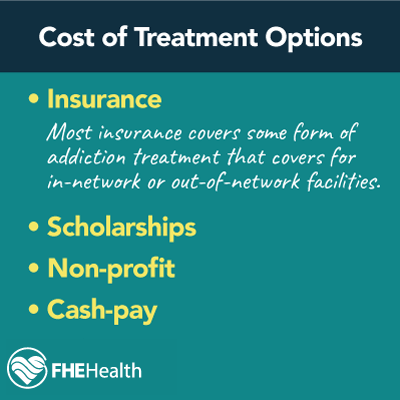 Many people feel daunted by the costs of treatment. Expensive programs can run people several tens of thousands of dollars a month out-of-pocket. It is important to consider all the options before choosing a treatment facility. On-site admissions staff can help you navigate the different payment plans.
Many people feel daunted by the costs of treatment. Expensive programs can run people several tens of thousands of dollars a month out-of-pocket. It is important to consider all the options before choosing a treatment facility. On-site admissions staff can help you navigate the different payment plans.
Insurance
Today, most PPO and some HMO policies cover substance use disorder treatment. Each policy has its own limitations, and it is important to understand what type of coverage you may have. If you would like assistance navigating your insurance plan, contact us to speak with a rehab admissions specialist.
Scholarships
Some treatment centers offer scholarships on a limited basis for individuals. These policies vary by location, and they all have different requirements. You can always ask a treatment center if they have a scholarship program available.
Non-Profit Organizations
Each state has its own resources and publicly-funded substance abuse programs available to those without insurance. These locations vary with their availability for treatment.
Cash Pay
Most treatment centers offer a cash-pay option for inpatient or outpatient care. Fees range depending on the facility, level of care, and length of treatment. Some treatment centers offer a sliding scale option depending on one’s income level. Others offer payment installments to pay over time. To learn more about cash pay rates at FHE Health, contact us today.
Financial Differences Between Inpatient and Outpatient Treatment
Total spending on substance abuse treatment in the U.S. in 2003 was $21 billion, but 77% of this spending was publicly financed. The American Society of Addiction Medicine suggests that the more treatment a patient receives, the more successful their long-term recovery is. Unfortunately, the choice of treatment is often dictated by what the patient’s insurance covers.
Overall, a detox treatment is the most affordable option, followed by outpatient treatment. Inpatient rehab is the most financially demanding treatment option because the costs include your room and meals for the duration of your stay. However, there are a variety of options for helping with the cost of treatment.
Types of Treatment Facilities
Today, there are numerous options available for treatment. Even within inpatient and outpatient settings, there are several variances built to help each individual.
Gender-Specific Programs
Men and women may have different needs when it comes to treatment. Working through these various needs and issues may not be appropriate with the opposite sex in the same room. This is especially true if there is a history of trauma. Many programs offer specific men or women’s programs for these reasons.
Age-Specific Programs
Entering recovery can be challenging at any age, and each age group has its own struggles. Today, there are many different options available, including adolescent programs, young adult programs, and programs tailored for elderly clients. The age separation allows clients to work on similar issues in a collaborative environment.
Dual Diagnosis Programs
Dual-diagnostic care provides mental health treatment in addition to substance abuse treatment. This often comes in the form of medication management and co-occurring therapy. It’s important for anyone entering recovery to also understand and manage their mental health. Otherwise, the risk of relapse typically increases.
Dual diagnosis programs may employ a variety of interventions including neurofeedback, brain stimulation therapy, and comprehensive psychological testing.
Executive or Luxury Programs
Some treatment centers specialize in providing high-end programs for high-powered professionals or celebrities.
These programs typically offer tailored treatment that may include extra amenities, including holistic care, massages, nutrition, and yoga. The program may also include policies that allow clients to utilize technology to stay up-to-date on their work.
LGBTQ Programs
Many treatment centers offer entire programs or specific tracks designated to support LGBTQ individuals. These programs are sensitive to the unique needs associated with substance use treatment and the common issues and traumas LGBTQ individuals may face.
Final Thoughts on Inpatient Vs Outpatient Drug Treatment
The decision to enter addiction treatment can be challenging and complicated, and it can be hard to know if you need inpatient vs. outpatient.
At the Florida House, we offer a complete continuum of care ranging from acute detox services to sober living housing. Together, we will decide the best option for you or your loved one. Together, we can take that first step towards building a happier and healthier life in recovery.
We’re available 24/7 to answer any and all questions you may have. Reach out for support today!






